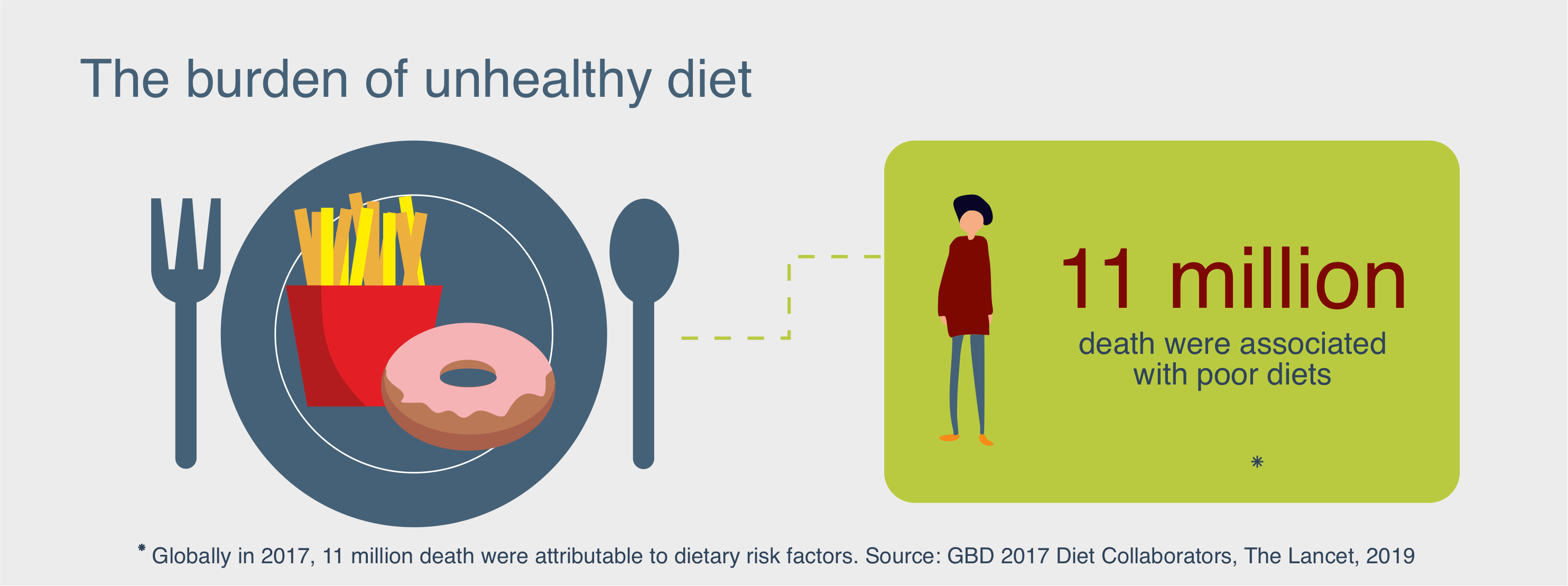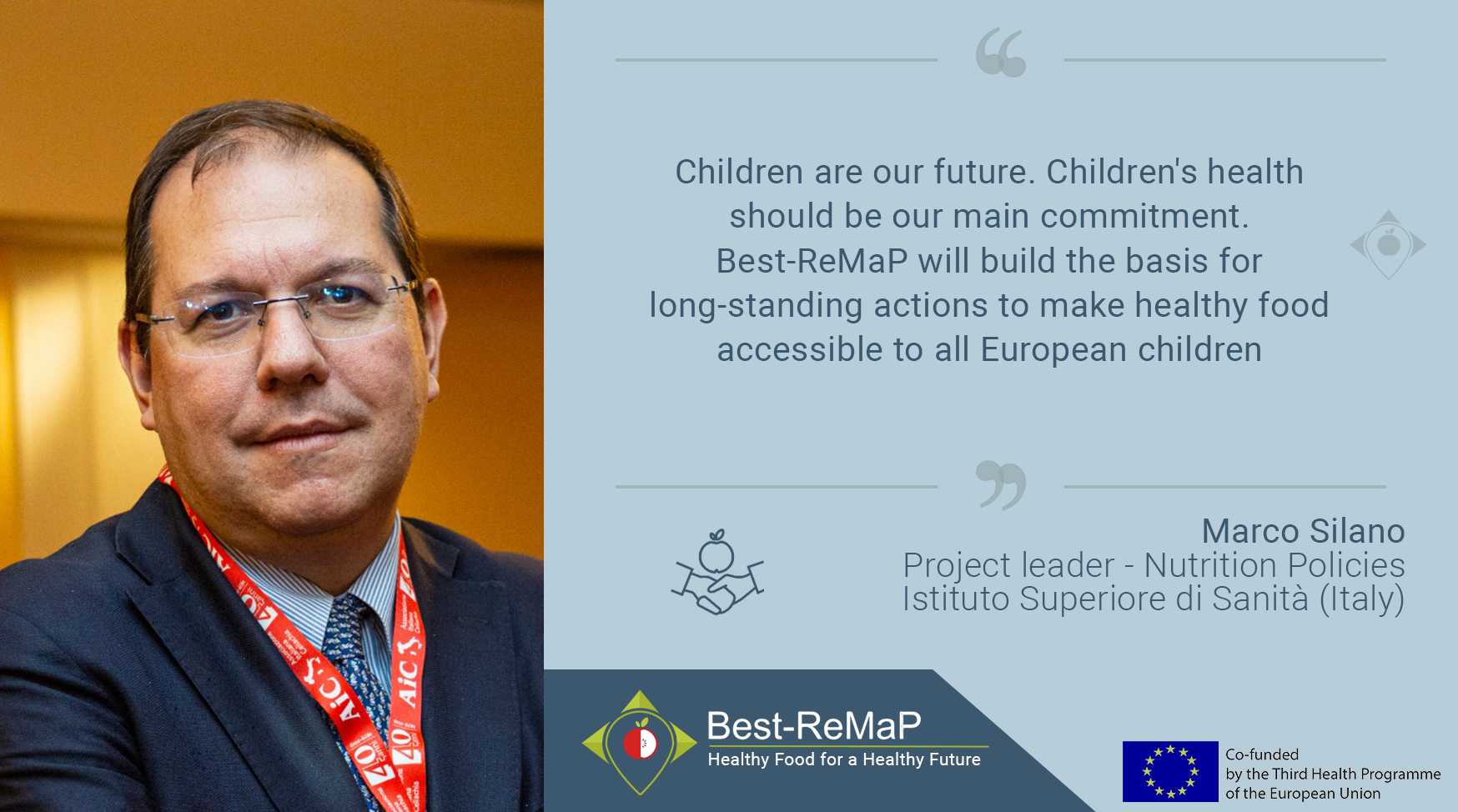
Lasting food and nutrition policies for a healthy Europe
Work Package 4
Problems associated with poor nutrition and unhealthy eating habits have affected and will continue to affect many generations of Europeans. Food and nutrition policies are aimed to improve the nutritional status of people by increasing the availability and access to healthy food.
Our vision
By turning results into policies our work intends to contribute:
- to an increased offer of healthier options of processed foods (by reducing salt, sugar and fat content) available in EU (super)markets;
- to a reduced marketing pressure of unhealthy foods and drinks on children;
- to a higher quality of menus within public institutions.

Our goals
This project team aims to support the implementation, transfer and integration of the results and outcomes of the Best-ReMaP Joint Action into national and EU-level policies in the areas of food reformulation, food marketing and public procurement of healthy food in public settings.
The JANPA Joint Action
In 2014, the EU Action Plan on Childhood Obesity 2014–2020 was launched with an overarching goal to halt the rise of overweight and obesity in children by the year 2020. To facilitate the implementation of the Action Plan, the Directorate-General for Health and Food Safety of the European Commission provided support to bring together 25 Member States plus Norway for a Joint Action on Nutrition and Physical Activity (JANPA). JANPA was among the key instruments proposed to facilitate the sharing of experience and good practices regarding programs and policies to tackle poor diets and physical inactivity between the participating countries. Read more about JANPA and check the JANPA Toolbox.
Why act?

Our knowledge-base
OECD (2019): The Heavy Burden of Obesity: The Economics of Prevention. Almost one in four people in OECD countries is currently obese. This epidemic has far-reaching consequences for individuals, society and the economy. Using microsimulation modelling, this book analyses the burden of obesity and overweight in 52 countries (including OECD, European Union and G20 countries), showing how overweight reduces life expectancy, increases healthcare costs, decreases workers’ productivity and lowers GDP. The report makes the urgent economic case to scale up investments in policies to promote healthy lifestyles and tackle this growing global public health problem. The book evaluates a number of policies which could significantly improve health outcomes while being an excellent investment for countries. Read more
Europe’s Beating Cancer Plan. Every year, 3.5 million people in the EU are diagnosed with cancer, and 1.3 million die from it. Over 40% of cancer cases are preventable. Without reversing current trends, it could become the leading cause of death in the EU. Europe’s beating cancer plan aims to reduce the cancer burden for patients, their families and health systems. It will address cancer related inequalities between and within Member States with actions to support, coordinate and complement Member States’ efforts. Read more
Roadmap for action on Food Product Improvement – Dutch EU presidency 2016. During the Dutch Council Presidency, the Dutch Minister for Health presented the Roadmap for Action on Food Product Improvement. The Roadmap contains agreements made between 22 EU member states, non-EU members Norway and Switzerland, nongovernmental organizations and food business operators to take measures to improve food quality and to make healthy choice the easy choice. Read more
Austrian EU Presidency 2018, Food Systems Dialogues event. The Food Systems Dialogue event was organized on 23 November 2018 in Vienna and involved approximately 30 participants, within a Conference hosted by the Austrian Presidency of the EU, entitled “People’s food, people’s health: Towards healthy and sustainable European food systems.” Read more
The Farm to Fork Strategy. The Farm to Fork Strategy is at the heart of the European Green Deal aiming to make food systems fair, healthy and environmentally-friendly. The Farm to Fork Strategy aims to accelerate the transition to a sustainable food system. Read more
What will Best-ReMaP do?
This team will strongly collaborate with other project teams. The outcomes regarding food reformulation, food marketing to children and public procurement will be channeled into a series of meetings both on European level and nationally in a group of participating countries. These events will primarily involve policy makers, but in a second round also include other stakeholders such as food producers and retailers.
Prepare a roadmap of relevant national and EU policies including the list of national and European stakeholders
The roadmap will summarize the relevant knowledge and outcome of previous and ongoing European initiatives, as well as key strategic documents and papers, with the aim to provide Best-ReMaP a solid base and a full integration with the state-of-the-art of the public health policies in food and nutrition at European level. Moreover, this desk research, performed with a systematic approach, will help to avoid the duplication of activities and focus the efforts of the current Joint Action towards the implementation of policies proved to be effective and feasible.
Report on Sustainability and Integration into National Policies
This report will summarize all knowledge gained in this work package. This includes meeting outcomes originated from the national and European level policy dialogues along with recommendations to change existing measures or to prepare and introduce new policies.
Report on Options towards Integration into National Policies and Sustainability
This report will pave the way for the stakeholder discussions and will leverage the knowledge gained in previous work on this area (e.g. JANPA and relevant Council Conclusions) and will analyze possible steps towards sustainable actions.
Prototype database, with recommendations for further steps
Linking the results of the core work packages, a food information database will be developed. This database will also include the results of the EUREMO project and JANPA if possible. The EC Joint Research Center can host the data in its open access Data Catalogue but will also explore the possibility of hosting the database in a more user-friendly manner by developing a visualization tool. The database will offer to the Member States a long-lasting tool to explore the data and make it available to researchers and public policy advisors for the national policies and legislation. A sustainable system to keep expanding the dataset by the Member States after the conclusion of the activities of Best-ReMaP will be defined.


The content of this website represents the views of the author only and is his/her sole responsibility; it cannot be considered to reflect the views of the European Commission and/or the European Health and Digital Executive Agency (HaDEA) or any other body of the European Union. The European Commission and the Agency do not accept any responsibility for use that may be made of the information it contains.

